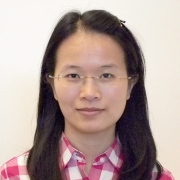YU-HuUI WONG ASSISTANT PROFESSOR
- E-mail: yuhui.wong@gmail.com
- TEL: +886-2-28267000 ext. 66252
- Yu-Hui Wong CV

2003.09-2009.12 Ph.D. in Neuroscience, National Yang-Ming University, Taipei, Taiwan (Mentor: Ming-Ji Fann, Ph.D.)
2001.09-2003.07 M.S. in Neuroscience, National Yang-Ming University, Taipei, Taiwan
1997.04-2001.07 B.S. in Life Sciences, National Yang-Ming University, Taipei, Taiwan
2020.08-present Adjunct Assistant Professor, Department of Life Sciences and Institute of Genome Sciences, National Yang Ming Chiao Tung University, Taipei, Taiwan
2016.02-present Assistant Research Fellow, Brain Research Center, National Yang Ming Chiao Tung University, Taipei, Taiwan
2014.08-2016.01 Postdoctoral Fellow, Brain Research Center, National Yang-Ming University, Taipei, Taiwan
2010.08-2014.07 Postdoctoral Fellow, Department of Molecular and Cell Biology, University of California, Berkeley, USA (Supervisor: Mu-ming Poo, Ph.D.)
Our laboratory is working on identifying the molecular mechanisms underlying how a pluripotent cell develops into a defined cell type of human brain, such as neurons, microglia, retinal ganglion cells and other neural lineages. This has allowed us to generate functional brain cells with high consistency at scale from human iPSCs, including patient-derived iPSCs or those carrying diseasespecific mutations by CRISPR/Cas9 technology, offering novel avenues for the development of human in vitro models to support research and drug discovery.
In the past four years, we used human iPSCs derived from familial and sporadic patients of Alzheimer’s disease (AD) to study disease mechanisms and to screen novel drugs for treatment. We differentiated the AD-iPSC lines into the neuronal lineage to examine whether these neurons have mature phenotypic and physiological properties, as well as AD-like biochemical features. We also established a novel protocol enabling differentiation of human microglia-like cells from hiPSCs in high purity, which is used to investigate the neuroinflammatory phenotypes of AD. In the future, AD-iPSC derived neurons and glial cells, plus 3D organoids, harboring disease properties will be used as humanized models to study the mechanisms underlying AD pathogenesis, as well as to evaluate potential drugs for AD treatment.
2001.09-2009.12 Molecular and Cellular Mechanisms of Neural Development
2010.08-2014.07 Mechanisms and Regulation of Neurotrophin Transport and Secretion
2014.08-presenst Modeling of Human Neurological Disorders Using Induced Pluripotent Stem Cells

教學及研究本著希望啟發及培育下一代神經科學人才,
將來對了解人類心理狀態、行為的根源及治療神經系統
的疾病有所貢獻。
